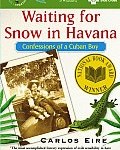 Carlos Eire was born during the 1950s into a fairly well off family in Havana on the island of Cuba. The son of a judge, Carlos and his brother learned to expect special privileges that came from being the children of a well-respected and powerful man. But everything in his life began to change when Fidel Castro waged revolution and toppled the Batista government. In the early 60s, at the age of 11, he and his older brother were sent to the U.S. to keep them safe. They never returned to Cuba.
Carlos Eire was born during the 1950s into a fairly well off family in Havana on the island of Cuba. The son of a judge, Carlos and his brother learned to expect special privileges that came from being the children of a well-respected and powerful man. But everything in his life began to change when Fidel Castro waged revolution and toppled the Batista government. In the early 60s, at the age of 11, he and his older brother were sent to the U.S. to keep them safe. They never returned to Cuba.
Waiting for Snow in Havana: Confessions of a Cuban Boy is Eire’s memoir of those magical days he spent as a boy in Havana. He and his friends roamed the neighborhood freely, playing games, lighting off firecrackers, tormenting lizards, and generally living a carefree life.
Eire’s recollections paint a vivid picture of times in Havana both before and after the revolution. He tells of grand parties and palaces, and resisters he knew of who were imprisoned and tortured. He talks about a cast of larger-than-life characters he remembers, like his father who claimed to be a reincarnation of King Louis XVI of France and his cousin Fernando who worked against the revolution.
We learn about how pervasive American culture was in Cuba in those days—Coca-Cola and American movies were favorites. The tale is both enlightening and fascinating about the times, and it is also heartbreaking to read about the way of life that was lost forever for so many.
Like Eire, around 14,000 children were sent the U.S. during those days. Their parents hoped to bring them home after a short amount of time, or join them later. Most never returned, and many parents were never able to leave Cuba. This story is about that exodus as well. I recommend it for ages 14 and up as well as adults.

